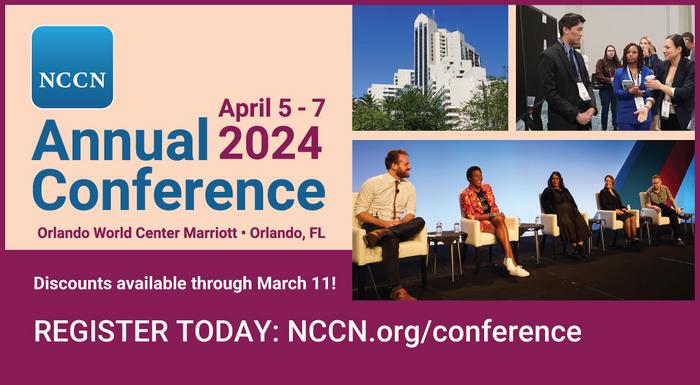PLYMOUTH MEETING, PA [March 4, 2024] — The National Comprehensive Cancer Network® (NCCN®) is announcing several new updates to the cancer treatment practices listed in the NCCN Clinical Practice Guidelines in Oncology (NCCN Guidelines®). The evidence-based expert consensus recommendations are the most frequently updated guidelines for any area of medicine and are used by cancer care providers worldwide to stay up to date on innovations. Recently, the alliance of leading cancer centers published updated versions for several high-incidence cancer types, including breast, colorectal, lung, and pancreatic.

Credit: NCCN
PLYMOUTH MEETING, PA [March 4, 2024] — The National Comprehensive Cancer Network® (NCCN®) is announcing several new updates to the cancer treatment practices listed in the NCCN Clinical Practice Guidelines in Oncology (NCCN Guidelines®). The evidence-based expert consensus recommendations are the most frequently updated guidelines for any area of medicine and are used by cancer care providers worldwide to stay up to date on innovations. Recently, the alliance of leading cancer centers published updated versions for several high-incidence cancer types, including breast, colorectal, lung, and pancreatic.
Recent NCCN Guidelines updates—along with the supporting evidence—will be presented during the NCCN 2024 Annual Conference held in Orlando, Florida April 5-7, and simultaneously online. Visit NCCN.org/conference to learn more and register.
“The pace of progress in cancer care is accelerating. The multidisciplinary panels of experts who maintain the NCCN Guidelines work diligently year-round to make sure these resources remain up to date with the most relevant information for the busy clinicians who use them,” said Crystal S. Denlinger, MD, Chief Executive Officer, NCCN. “At our upcoming conference, attendees will learn about all the latest updates directly from the experts behind them, while gaining a better understanding of the underlying evidence supporting these updated recommendations.”
Current NCCN Guidelines are available for viewing and downloading free-of-charge online at NCCN.org or via the Virtual Library of NCCN Guidelines® App. In 2023 alone, the NCCN Guidelines were downloaded more than 15 million times worldwide—a new milestone for the organization. NCCN Guidelines are now accessed more than a million times every month, illustrating the growing need for state-of-the-art oncology guidance.
Some recent updates to the NCCN Guidelines recommendations include:
- Updates to treatment of HR-positive, early-stage breast cancer, including a new page outlining the general principles for adjuvant endocrine therapy.
- Recommendation for considering POLE/POLD1 mutation testing for checkpoint inhibitor therapy for colon and rectal cancer.
- Addition of a new perioperative immunotherapy option for resectable non-small cell lung cancer.
- New chemotherapy options for first-line therapy for patients with metastatic pancreatic cancer.
- Changes to the Principles of Pathology for bladder cancer, based on the 2022 WHO Classification of Tumors of the Urinary Tract.
- Revisions to the Hereditary RCC Syndromes Overview for kidney cancer.
Every recent practice improvement contained within the NCCN Guidelines can be viewed at NCCN.org/guidelines/recently-published-updates.
In addition to multiple sessions covering those updates and more, the NCCN 2024 Annual Conference will also showcase more than 200 poster abstracts featuring new research, including guided tours available for in-person attendees.
Additional conference session topics will also include interactive discussions on:
- Genetics/hereditary risk.
- Vaccination for cancer survivors.
- Screening and supportive care.
- Preventing and addressing drug shortages.
- Artificial intelligence (AI) in oncology and healthcare.
- Maximizing staffing and healthcare resources.
“I have personally considered the NCCN Annual Conference to be one of the most essential meetings in cancer care every year, long before I ever joined the organization,” said Dr. Denlinger. “It presents an invaluable opportunity to speak face-to-face with experts and colleagues in the field while gaining critical knowledge and perspective on the most pressing issues facing the oncology community at this moment in time. We are grateful for all the dedicated cancer care providers around the world who utilize our continuing education programs and updated guidelines to ensure people with cancer everywhere can live better lives.”
Visit NCCN.org/conference for the full agenda, list of speakers, new networking opportunities, and more. Early bird registration and the hotel room block closes on March 11, 2024. Complimentary passes are available for members of the press.
# # #
About the National Comprehensive Cancer Network
The National Comprehensive Cancer Network® (NCCN®) is a not-for-profit alliance of leading cancer centers devoted to patient care, research, and education. NCCN is dedicated to improving and facilitating quality, effective, equitable, and accessible cancer care so all patients can live better lives. The NCCN Clinical Practice Guidelines in Oncology (NCCN Guidelines®) provide transparent, evidence-based, expert consensus recommendations for cancer treatment, prevention, and supportive services; they are the recognized standard for clinical direction and policy in cancer management and the most thorough and frequently-updated clinical practice guidelines available in any area of medicine. The NCCN Guidelines for Patients® provide expert cancer treatment information to inform and empower patients and caregivers, through support from the NCCN Foundation®. NCCN also advances continuing education, global initiatives, policy, and research collaboration and publication in oncology. Visit NCCN.org for more information.




